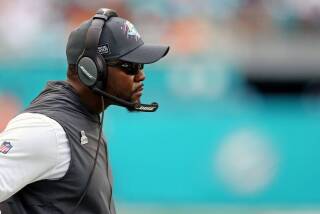COCAINE AND A SUPER BOWL TEAM: THE LAST STRAW : Patriots’ Action Brings a Swift Reaction : The NFL Players’ Assn. Says It Will Challenge New England’s Plan for Voluntary Drug Testing
- Share via
Gene Upshaw, executive director of the National Football League Players Assn., said Tuesday that the decision by the New England Patriots to accept a voluntary testing plan by the players violated the collective bargaining agreement and that the union would file a grievance with the National Labor Relations Board.
Currently in Honolulu for Sunday’s Pro Bowl, Upshaw did not return phone calls Tuesday, but he told United Press International that he was in shock at the Patriots’ action and could not allow it to go unchallenged.
“We’re not trying to protect the drug users,” he said. “We’re not trying to hide and say there is no problem. We want the players who need help to get it. But we also have to protect the rights of players who do not have a problem, along with the rights of players who may be traded to the Patriots and who don’t go along with their agreement.
“The collective bargaining agreement must affect all players and clubs equally for the system to work. For the Patriots to have an individual policy is something we can’t agree with.”
The Patriots adopted their own policy during a team meeting in New Orleans Monday, only a few hours after they had lost to the Chicago Bears in Sunday’s Super Bowl, 46-10.
Coach Raymond Berry later told the Boston Globe that at least five Patriots have a serious drug problem and that five to seven more are suspected of having problems. He said it was time to do something about it, time to impress his team with the seriousness of the situation.
The Patriots responded by approving a voluntary testing plan that will be administered by Massachusetts General Hospital. Some details are yet to be worked out, but the players will apparently form their own review board to evaluate any player who has a problem and recommend a course of action.
The program will be in effect only for as long as Berry is the coach and Patrick Sullivan is general manager. Berry said that he was of the opinion that once a player is “cleaned up,” any recurrence of a drug problem would result in a year’s suspension without pay.
Seven of the 59 Patriots voted against the plan and several others abstained, according to the Globe and other sources, but it was approved by more than a three-fourths majority, which the players had established as a prerequisite.
Upshaw, whose union does not approve of spot testing, said that Berry had broken faith with the union by appealing to his players at a time when they were particularly vulnerable.
“We can’t let management pressure individual players into personal agreements which ignore the collective bargaining agreement in the heat of the moment,” he said.
“Raymond Berry had everything he needed at his disposal to deal with specific players whom the club had reasonable cause to suspect of drug use. If Berry were dealing in good faith with the Patriots players, he would have followed the drug testing and rehabilitation program in the collective bargaining agreement.
“If they’re allowed to suspend for a year in Boston (when a player has a recurrence of a problem that was thought to be cleaned up), what will they do in the next city, shoot you? Kill your first born in the next city after that? We can’t have this vigilante approach. It’s not the answer to the problem.”
Upshaw said that a union survey taken near the end of the regular season showed that 72.5% of players opposed spot testing. He said that the Patriots would have opposed it had they not been pressured by Berry and Patriot management.
Ron Wooten, the Patriots’ assistant player representative, said, however, that it was out of respect for Berry and his handling of the situation that the plan was approved.
He also said at a Boston press conference Tuesday that most of the Patriots were flabbergasted by the extent of the problem and did not want to see key players traded because they had drug problems that could be treated.
Wooten said he had been caught in the middle and had voted against the plan because of his association with the union as a player representative but added: “I’m certainly more behind the program here than with the union in Washington. The union sees a need for this program, too, but they want to do it on a collective basis.
“We felt that we don’t have that much time. Individuals are more important than the union as a whole. I mean, practically everyone voted for it except those who felt their responsibility to the union was too great. In fact, it was the guys with the problems who were the first to support it, and that speaks for itself.”
Of Berry’s role, Wooten said: “No other coach could have pulled this off. Raymond had the influence with the team to get this started on an informal basis. Raymond’s handled it with a soft glove. He hasn’t taken any punitive action. He’s very understanding about the players’ different backgrounds and values.
“I think this has all happened because of Raymond’s integrity, character and leadership. Not all teams have someone who wants to help and not punish. That’s what sold us on the program.”
Berry, who told the Globe that he had begun to think about a voluntary program even before the 1985 season started, was asked at Tuesday’s press conference if an obligation to the league and its fans didn’t require him to reveal the problem earlier--certainly before the Super Bowl.
“At no point were we treading water, letting the problem slide,” he said. “We talked to a number of players during the course of the season and even tested a couple. I didn’t think we could address it publicly without destroying our complete concentration, but we made progress on it, we had results.
“I had to weigh the damage that could be done by going public. I felt we could handle it internally and continue to pursue our goal. If it had ever reached a point where it prevented us from playing to our capability, I’d have said so publicly.”
In finally exposing the situation and asking his players to support a voluntary testing program, Berry said that the league and union have lacked the courage to attack the drug issue, that they are still too concerned about the negative publicity.
Commissioner Pete Rozelle and his top assistants were said to be in transit from New Orleans Tuesday and unavailable for comment.
Tex Schramm, president of the Dallas Cowboys, was reached at his Texas home and said he supported Berry’s handling of the situation.
“I think that both Ray and the writer (the Globe’s Ron Borges began asking questions about the Patriots’ alleged drug use in mid-January) were aware that a problem existed,” Schramm said. “But neither had firm proof with which you could go public. Ray may not even be sure of the facts today.
“I mean, I’ve been involved with that situation on my own club and heard stories regarding players on other teams, but it’s difficult knowing when you’re dealing with the truth, when you have enough facts to go public. I have to respect the way Ray handled it.
“It’s a terrible shame, of course, when you have something as disappointing as this come in the wake of a great event like the Super Bowl and a great accomplishment such as the Bears produced, but you have to look on the positive. The more times that a harsh spotlight is turned on the problem, the more likelihood that we’ll find a solution.
“As I’ve said before, there’s only one way to do it, and that’s with mandatory, unscheduled testing.”
The players’ association is already involved in a drug related grievance procedure against the NFL, dealing with the contention of the NFL’s Management Council that the current collective bargaining agreement, which expires in August of 1987, allows the clubs to conduct a urinalysis as part of postseason physicals.
The union disagrees and has asked for a ruling by the NLRB. The grievance was filed when the St. Louis Cardinals fined a number of its players $1,000 each for refusing postseason urinalyses. Players on seven other NFL teams--Buffalo, Indianapolis, New Orleans, Tampa Bay, Detroit, Seattle and the New York Jets--also refused to take postseason drug tests.
The only mentions of drug testing in the current agreement are in Section VII, which gives club physicians permission to order testing where there is reasonable cause, and Section VIII, which says that treatment details must remain confidential and are not, in themselves, the basis for disciplinary action. The union heatedly disputed the Management Council’s training camp memo which said that coaches and trainers could request team doctors to order a urinalysis based on a cumulative pattern of danger signals.
“We still believe that drug evaluations should be made by professionals and not amateurs,” a union source said Tuesday.
More to Read
Go beyond the scoreboard
Get the latest on L.A.'s teams in the daily Sports Report newsletter.
You may occasionally receive promotional content from the Los Angeles Times.










